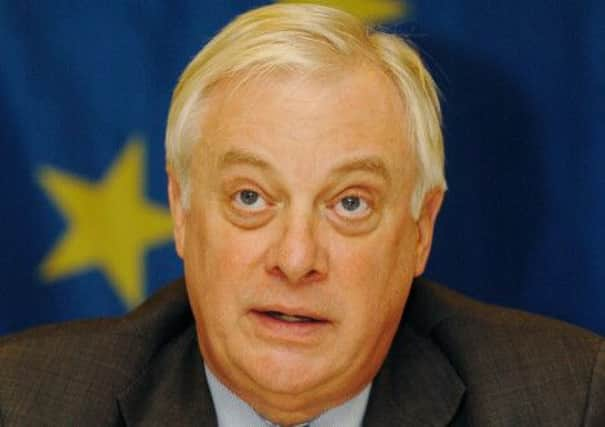Anti-EU Tories warned of ‘political suicide’


• The Conservative Party risks “political suicide” if it rejects EU membership in any form
• Former party chairman Chris Patten also warns voters could punish disunited Tories at next election
Advertisement
Hide AdAdvertisement
Hide AdLord Patten said it was too early to say what reforms Prime Minister David Cameron will be able to achieve in the renegotiation of the UK’s membership which he has promised if the Tories win the 2015 general election, but said it should be “perfectly possible” to reach a favourable outcome.
And he predicted that the electorate will punish the Conservatives at the ballot box if they appear disunited over the issue.
Speaking to a Westminster lunch, the former European Commissioner said: “I think it should be perfectly possible for this country to find a relationship with the rest of the EU which strengthens the single market, which ensures that Europe is still open to the world and open to free trading principles, without Britain being drawn into European enterprises which involve unacceptable sacrifices of political sovereignty.
“It is difficult to say exactly what would be acceptable at this point. But if your response to that is that nothing would be acceptable, then I think that would be bad news for the Conservative Party.
“If nothing is acceptable, I recall Winston Churchill’s very wise observation that the problem with political suicide is that you live to regret it.”
Lord Patten, who served as Tory chairman from 1990-92 and helped John Major secure a surprise victory in the 1992 election, said that displays of disunity could be fatal to the Conservatives’ chances in 2015.
Since 1992, he said, “for reasons which I have observed with interest, the Conservative Party has had a lot of arguments internally about Europe and Conservative leaders have had a problem straddling their view of the national interest and the management of the Conservative Party.
“I think that is an issue which any Conservative leader or any Conservative prime minister is going to find him or herself facing for some time to come.”
Advertisement
Hide AdAdvertisement
Hide AdAnd he added: “It is very difficult to lead any party which is not united and win an election... Parties that don’t look united don’t win elections.
“What used to be one of the most important characteristics of the Conservative Party - and I hope still is - is that it was more interested in running the country than in who ran the Conservative Party. It was more interested in the idea of continuing the Queen’s government than any ‘idee fixe’ about policy. That’s why the Conservative Party has been around for longer than any other.
“If people start to think you are more interested in fighting one another than fighting for the country, then the game is up.”
Lord Patten, who is now serving as chairman of the BBC Trust, acknowledged that the scandal around sex abuse claims linked to former BBC presenter Jimmy Savile - which cost director general George Entwistle his job last autumn - had been a “pretty taxing” time for him, but joked: “I’m still alive.”
He said he had not yet been approached about whether he would serve a second four-year term as chairman of the Trust when his first term ends in 2015.
Amid Westminster rumours that the Department for Culture, Media and Sport (DCMS) may be axed in a future Cabinet reshuffle, Lord Patten gave strong backing to Maria Miller’s ministry.
“I don’t think merging DCMS into another department would make sense,” he said.
“I think it is a department which has an important job to do and I hope will continue to do that with Maria Miller and Ed Vaizey and others.”
Advertisement
Hide AdAdvertisement
Hide AdLord Patten, who is also chancellor of Oxford University, did not throw his weight behind London Mayor Boris Johnson’s suggestion that Oxford should name one of its colleges after Baroness Thatcher, to make up for the slight of denying her an honorary doctorate in the 1980s.
He said that Thatcher’s old college Somerville was creating a “lasting memorial to an extraordinary woman and an extraordinary politician who changed the way this country is governed” by establishing Thatcher scholarships in her memory.
But he said that the obstacles in the way of a Thatcher College may be too great.
“You would either have to start a new college, which would be expensive, or you would have to persuade Jesus (College) or Corpus Christi or Christ Church to change their name,” he said.
“It may be thought - however admirable she was - slightly pushing it to persuade Jesus to change its name.”
SEE ALSO